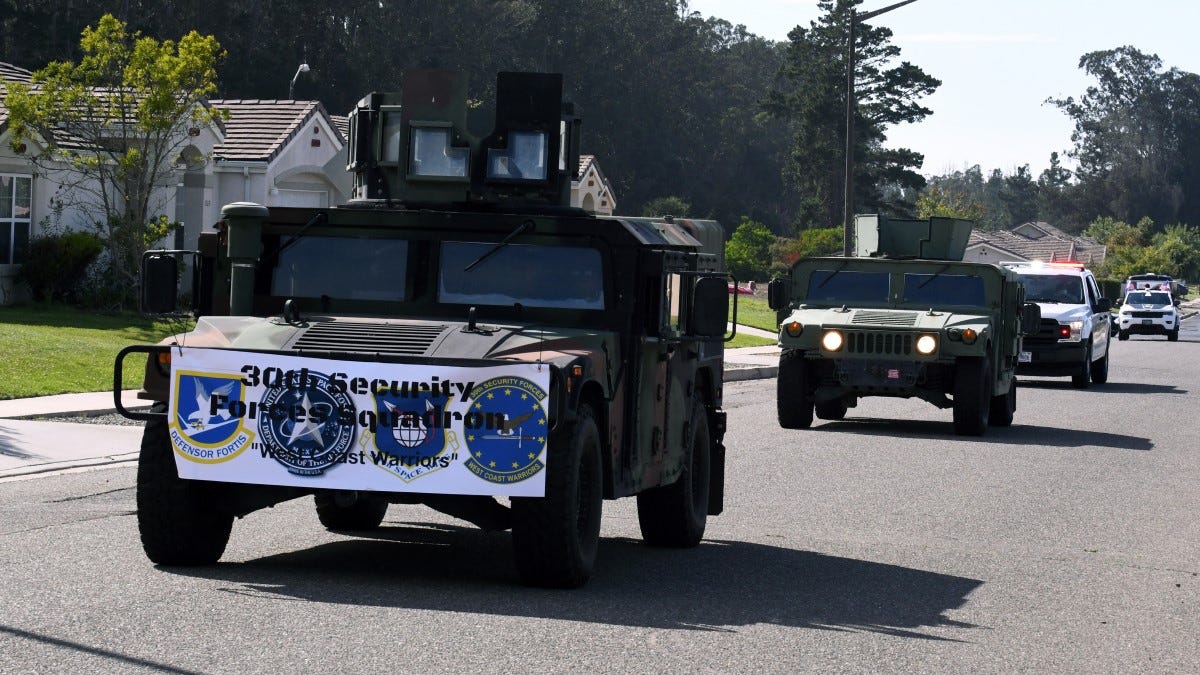Governance Abhors A Vacuum
Imagining the end of the Space Force means thinking beyond orbital cops, satellite warriors, or Air Force Space Command.

More than anything except the Border Wall and ICE, the Space Force has the stink of Trump on it. The wall construction has been formally halted, ICE has been ordered to stand down (orders it is presently defying) and the Space Force, in the words of White House press secretary Jen Psaki, "absolutely has the full support of the Biden administration. And we are not revisiting the decision to establish the Space Force."
The persistence of the Space Force can read, I think understandably, as a betrayal of by the Biden administration to the project of unmaking the Trump era. I think having a branch of the military entirely dedicated to Space War is destabilizing, and it doesn't help that case that Trump conflated NASA's civilian & scientific missions with Space Force's formally more violent one.
So when Slate asked me to write about what Biden should do with the Space Force, I expected to make the case for abolishing it. That is not how the piece turned out.

There are two reasons that the Biden Administration did not abolish the Space Force, I think. The first, and more obvious one, is that it didn't see the fight as worth having. The Space Force was created by an act of Congress, and it would take legislative action to undo it. That's not impossible; by thin margins the Democratic Party holds the House and (barely) the Senate, so the power is technically there, but everyone in the Senate and the White House would have to agree that this was a fight worth having.
That consensus isn’t there, for reasons that will likely get explained away as “a lack of political capital.”1
The problem isn’t that Biden couldn’t win the fight on abolishing the Space Force if he wanted to. Instead, the problem with Space Force is that the returns on that fight are really, really low. And that sets up the second reason I think the Biden administration isn't moving to abolish Space Force: Air Force Space Command, the precursor to Space Force, did almost all the same stuff.
Something lost in the general conversation around the Space Force is that the idea predates Trump, and that the execution was mostly set by Congress as a way of expanding what the Air Force already did. This shouldn't be so surprising; Trump's single skillset is grabbing attention, and with the Space Force he managed to take an existing idea and then spin it as his own unique tool of domination.
This phenomena, of Space Force as distinct from Trump's branding, is best documented by my former colleague Valerie Insinna at Defense News.
"For much of the public, the Space Force is seen as a vanity project of Trump’s instead of a long-debated military organization necessary to ensure that the Defense Department can counter Russian and Chinese threats,” writes Insinna. “Trump has bolstered that perception in his own public statements, telling troops during a teleconference last Thanksgiving that “nobody even thought about the Space Force” before him.”
Insinna’s story is, I think, the essential beat reporting read on how the Space Force came to be. It was a piece of bipartisan legislation before it was a Trump-branded product, and it was part of a longer debate over how to manage resources in orbit.
Here’s the other essential part of that story: “The Space Force, as it exists now, is fundamentally a rebranding of the Air Force’s legacy space organizations — specifically the now-defunct Air Force Space Command,” writes Insinna. “The service currently controls about $15 billion in annual spending, commands dozens of military satellites and tracks more than 24,000 objects in space.”
That is, ultimately, what settled my understanding of the ceiling on the possible for what abolition of the Space Force would look like under a Biden administration. If abolished, it would mostly destroy a brand, while leaving all the tools of space militarization in place.
Here’s part of what I wrote for Slate:
There is plenty of, er, space for Russia, China, and the United States to negotiate new agreements banning the testing of debris-causing anti-satellite tests, and to establish a verification regime for specific anti-satellite satellites. It is harder to come up with rules governing hacking and jamming attacks on satellites, but they are also less likely to immediately result in debris that threatens other objects in orbit.
I put my ceiling and what the Biden administration will do with Space Policy as 1) possibly negotiate a new treaty regarding weapons in space, and 2) maybe stop talking about space as a place to fight wars. I’m somewhat more confident in the former than the latter.
That doesn’t mean this should be the ceiling of the possible, or that we shouldn’t ask for an end to Space Militarism. I didn’t get into this beat just to describe the world as it is, without at least asking what better futures could exist.
Abolishing the Space Force doesn’t , in and of itself, set up one of those better futures, or at least it doesn’t without also abolishing the Air Force and, broadly, the entire military and surveillance apparatus in orbit.
Earlier in the Slate piece, I argue that the danger is the Space Force seeing itself as a tool to fight wars with weapons, and the best-case scenario organizationally is it instead seeing itself as something between a communications support service and orbital traffic cops. The Pentagon has a ton of agencies and components that sit under the purview of the Department of Defense but outside the services, collectively grouped as the “Fourth Estate.” The Space Force could easily be another support agency or, alternatively, a kind of combatant command, the spatial-or-activity groupings that the military uses to route orders or direct regional violence.
This mundane relegation of the Space Force is undermined by, well, its stated object to do violence in orbit, and its weapon that lets it do so. I, in my error,2 initially filed a story claiming Space Force has no publicly disclosed weapons. It in fact has one: the “Counter Communications System Block 10.2,” a kind of jammer o̶n̶ ̶a̶ ̶s̶a̶t̶e̶l̶l̶i̶t̶e̶3, that became operational March 9th, 2020. As weapons go, jammers sit above compromised computers and below blown-up objects, so while it doesn’t have the same immediate threat of a space gun, it matters that the Space Force sees it as a weapon and wants to talk about it as such.
The jammer, or, as the Space Force describes it, “a transportable space electronic warfare system that reversibly denies adversary satellite communications” is a way to exert some hostile control over other objects in orbit, both civilian and military. That former part is big, but I’ll get to that in a second. It’s all but inevitable that, had this weapon’s development cycle finished two years earlier, it would have gone to Air Force Space Command instead of the Space Force, and if the Space Force didn’t exist, the weapon, and the people controlling it, would still be part of the military.
Satellites are owned by countries or companies, and the Space Force wants to have dominion over both. In the traffic cop version of the Space Force, it is less a military fighting wars and more a military that sees itself as enforcing the day-to-day law in orbit. It would do so in accordance with the laws of the United States, which raises one big question: are Space Force guardians subject to Posse Comitatus?
The Posse Comitatus Act is a law passed in 1878 that restricts the use of Federal troops to enforce the law unless explicitly granted permission by Congress or the Constitution to do so.4 It applies directly to the Army and, because the Air Force grew out of the Army Air Force, it applies there, too. By practice, the Navy and Marine Corps follow the restrictions, though the Coast Guard is explicitly exempted.

As the year 1878 gives away, the Act followed the end of Reconstruction, in which Federal soldiers enforced the constitution in southern states. Its immediate pretext was a series of strikes in Northern and Western states 1877, in which President Hayes responded to worker action by sending in the Army. As Richard White writes in The Republic For Which It Stands, the passage of the act “created a greater reliance on state militias to supplement the police and private guards.”
With the Federal government no longer using the military to enforce the law internally, local and private forces took over. In the Gilded Age United States, that meant a tremendous amount of local violence holding up the existing economic and racial order (or, in the case of the withdrawal from Reconstruction states, no longer protecting Black people from white violence).
Why it matters for the Space Force is that the military has explicitly made the case that the Space Force should be exempt from Posse Comitatus, in part because there’s no local authority that can enforce space law in orbit.
“In the space domain, perhaps more than any other domain, the line between civil and military are blurred, and there is not a civil law enforcement infrastructure in space. As a result, the [Space Force] will have a significant responsibility to enforce and assist in the enforcement of the laws of the United States,” argue two Air Force majors, Dustin L. Grant and Matthew J. Neil. “For this reason, perhaps more than any other, the [Space Force] needs to be an independent force as opposed to a force organized under the [Air Force] —to avoid potential conflicts with the Posse Comitatus Act.”
The paper, which was submitted in 2018 before the Space Force was established, and published in 2020 after its creation, outlines possible legislative language to ensure that, when doing violence in orbit, Space Force agents would act as cops, instead of soldiers.
“Though the United States can enforce provisions of domestic law through punitive actions on Earth for companies or entities that might violate [the United States Commercial Space Launch Competitiveness Act], there is not an on-orbit force capable of such law enforcement or in- person monitoring,” write Grant and Neil. Left undiscussed is how a US domestic law governing space would give a Space Force enforcement powers over the satellites, commercial or military, of other nations.
Despite the case made for the military to enforce law in orbit, the same bill that created the Space Force amended the Posse Comitatus Act to include the Space Force, too. As scholar David Burbach points out, most of the actual enforcement of anything space law-related will take place on Earth, through existing agencies.
Still, as scholar Lindsay P. Cohn notes, many of the constraints on military action as law enforcement stem not from the Act, but from executive orders and Department of Defense regulations, and could be shifted by executive order.
It’s hard to imagine anyone outside of certain corners of Congress or the Pentagon getting super excited about using an anti-satellite jammer j̶a̶m̶m̶e̶r̶ ̶s̶a̶t̶e̶l̶l̶i̶t̶e5 to enforce American space law, which is at least a step better than calls to treat space as a domain of war and a place for American domination.
In looking to solve the problem of space militarization, which risks turning orbit into a wasteland of debris inhospitable to any satellites, we have to see orbit as the Space Force imagines it right now, which is as a police beat patrolled by robots commanded by humans.
That it’s unlikely the Biden administration will imagine a better possibility doesn’t mean we should be resigned to “war or policing” as our only alternatives to governing and managing orbit. Treating space as a likely battlefield or a police beat is only possible when the United States goes it alone in enforcing control in orbit. It is bad if any country does this, and it is worse if multiple countries do this.
Because orbit is a shared domain, the rules and governance for orbit need to be a shared project, set by multiple nations and with respect, especially, to the harms such conflicts could have for people living on the planet below, which is to say, all people.
My greatest non-error-related regret in my Slate Space Force piece is that I didn’t have more of a vision for what orbit looks like governed by anything other than violence. I still don’t, really; the history of Posse Comitatus shows that formally removing the military from law enforcement is likely to be rife with exceptions. Beyond that, trusting companies to enforce rules as they see fit, with whatever weapons and mercenaries they can bring to bear, is ultimately a disaster, and space billionaires are already openly planning for a New Gilded Age.
I still think the Space Force as satellite soldiers or orbital cops is a bad idea. I just don’t think dueling bands of Musk and Bezos-branded robot-corsairs are any better, though they’re one way to fill such a, er, void.
I desperately want to imagine a better future than all that. The best I can say is that, because it is expensive and difficult to try and enforce space law with dueling robots, negotiating a peace in the heavens might be easier than fighting it out.
Thank you all for reading. At some point this year, I’m going to send a survey asking for more information on how I can better serve you. You are the audience I most enjoy writing for, and I want to know what I can do to ensure that these newsletters are still writing you appreciate.
If you’re in the mood for more newsletters, may I recommend checking out what we’re doing over at Discontents?
"Political capital" as a concept gets brought up a lot to explain why elected leaders don't metaphorically spend their mandates on some policy objectives. It’s is a flawed metaphor, for a host of reasons, outlined well by Jamelle Bouie in his latest newsletter. Here’s the key bit: “we should think of political capital as all of the resources you have to make productive investments for your political party...And if those investments pay off — if your policies work and are popular — then you’ll move forward with even more capital than you had.”
A quick note on errors and corrections. I hold both of these things to be true: any given error could have been caught before publication, and given a long enough time, every writer will eventually publish with an error. Getting two simple facts wrong in my Space Force article didn’t feel great, but I’m happy to be in a profession where it’s more important to update the story to reflect truth instead of masking errors to protect the ego of writers. Part of the mission of this newsletter is to show my behind-the-scenes process, and some of that is just me making real bone-headed mistakes.
Speaking of errors and corrections, “Counter Communications System Block 10.2 “ is a ground-based satellite jammer, not a space-based weapon. Thanks to Jonathan McDowell for pointing this out.
Highly recommend this Lindsay P. Cohn thread on Posse Comitatus.
see footnote 3





